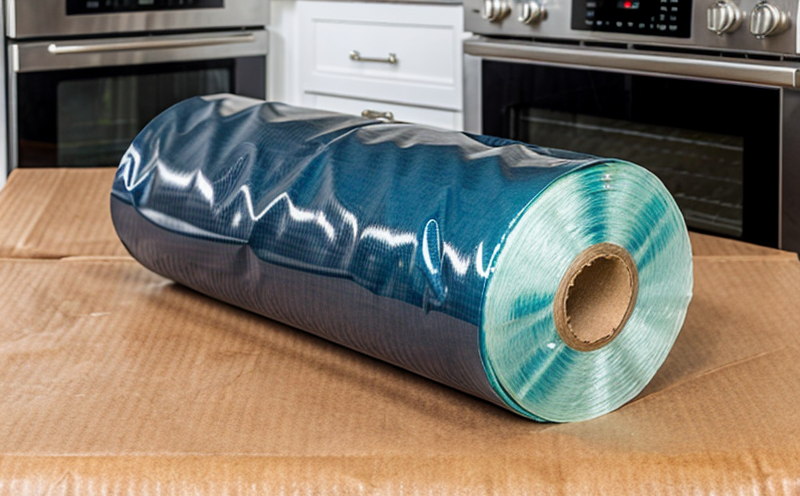NF EN 13130 Specific Migration Testing of Plastic Household Covers
The NF EN 13130 standard is crucial for ensuring the safety and compliance of plastic household covers, particularly those in direct contact with food. This testing procedure aims to verify that any potential leachable substances from these materials do not migrate into the food at levels exceeding safe limits as defined by relevant health regulations.
Specific migration tests are conducted using a simulated environment that mimics real-life conditions of use and storage, including temperature variations and contact with different food simulants. This ensures that the testing reflects actual usage scenarios. The test involves placing the plastic sample in contact with a food simulant for a specified period before measuring any leachable substances.
The primary focus is on ensuring compliance with EC Regulation (EC) No 10/2011, which stipulates that certain chemical elements and compounds are not permitted to migrate into food at levels higher than those set by the European Union. This regulation applies particularly to plastics in direct contact with food.
The testing process is highly technical and requires precise control over environmental conditions such as temperature and humidity. The apparatus used includes a specific migration tester that provides accurate measurements of the leachable substances. Specimen preparation involves cutting the plastic sample into standard sizes, which are then placed in contact with the food simulant under controlled conditions.
Acceptance criteria for this test are stringent, ensuring that no hazardous materials are present at levels that could pose a risk to human health. Compliance with these standards is essential for manufacturers of household covers and other similar products to ensure they meet regulatory requirements and maintain consumer trust.
The NF EN 13130 standard also emphasizes the importance of ongoing research into new plastic formulations and their potential impact on food safety. This includes understanding how different additives, fillers, and processing techniques affect migration behavior.
For quality managers, compliance officers, R&D engineers, and procurement specialists involved in household cover manufacturing, this testing is critical to ensuring product safety and regulatory compliance. By adhering to these standards, manufacturers can build a reputation for producing high-quality products that are trusted by consumers.
Scope and Methodology
The NF EN 13130 standard covers the specific migration testing of plastic household covers intended for direct contact with food. This includes materials such as cling films, kitchen wraps, and similar products that come into frequent contact with food during storage or preparation.
- Simulated Environments: The test uses various food simulants to mimic actual food types, including water, olive oil, vinegar, and fruit juice. This allows for a comprehensive assessment of the potential migration of substances from the plastic into different food types.
- Contact Time: Specimens are left in contact with the simulant for specific durations as outlined in the standard, typically ranging from 4 to 24 hours depending on the type of food and expected use.
- Measurement Techniques: The amount of leachable substances is measured using analytical methods such as gas chromatography-mass spectrometry (GC-MS) or high-performance liquid chromatography (HPLC). These techniques provide precise measurements necessary for compliance checks.
The methodology also includes detailed procedures for specimen preparation, including the cutting and handling of samples to ensure uniformity. This ensures that all samples are tested under consistent conditions, leading to reliable results.
Industry Applications
- Kitchen Wraps: Ensures that kitchen wraps used for storing food do not leach harmful substances into the food, maintaining product integrity and safety.
- Cling Films: Guarantees that cling films used in food packaging remain safe even when exposed to various food simulants and storage conditions.
- Plastic Covers: Provides assurance that covers for food containers are free from substances that could contaminate the contents, protecting both product quality and consumer health.
The NF EN 13130 standard is particularly important in sectors such as packaging manufacturing, where products come into frequent contact with food. Compliance helps manufacturers meet regulatory requirements and build a reputation for producing safe and high-quality products.
Environmental and Sustainability Contributions
The NF EN 13130 standard not only focuses on immediate safety but also contributes to broader environmental sustainability goals. By ensuring that plastic household covers do not leach harmful substances, the standard helps reduce the risk of contamination in food chains, which is crucial for maintaining environmental health.
- Reduction in Waste: Ensuring compliance with migration testing standards can lead to better disposal practices and recycling rates. Consumers are more likely to recycle compliant products knowing they do not contain harmful substances that could affect the environment.
- Sustainable Packaging: The standard encourages manufacturers to use sustainable materials and processes, which contribute to a circular economy by promoting recyclability and reducing waste.
The NF EN 13130 standard thus plays a vital role in supporting both immediate safety concerns and long-term environmental sustainability goals. By adhering to these standards, manufacturers can contribute positively to the overall health of ecosystems and consumer trust.





